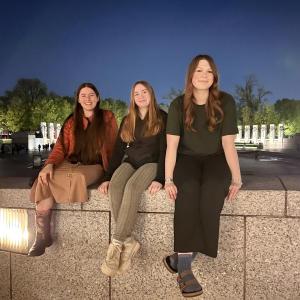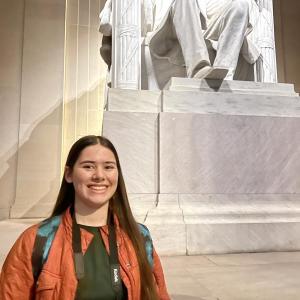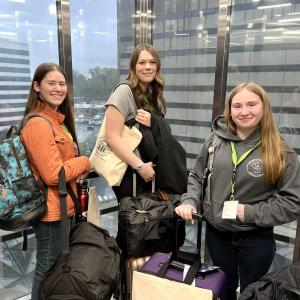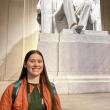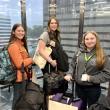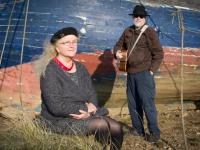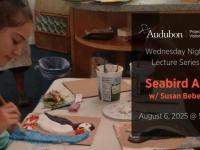Three Maine teens learn how federal policies are developed at National 4-H Conference
 Sabrinnah from Lincoln County, Kaylee from Penobscot County, and Kai from Washington County visited the World War II monument while in Washington D.C. for the National 4-H Conference. (Photos courtesy University of Maine Cooperative Extension / Jessy Brainerd)
Sabrinnah from Lincoln County, Kaylee from Penobscot County, and Kai from Washington County visited the World War II monument while in Washington D.C. for the National 4-H Conference. (Photos courtesy University of Maine Cooperative Extension / Jessy Brainerd)
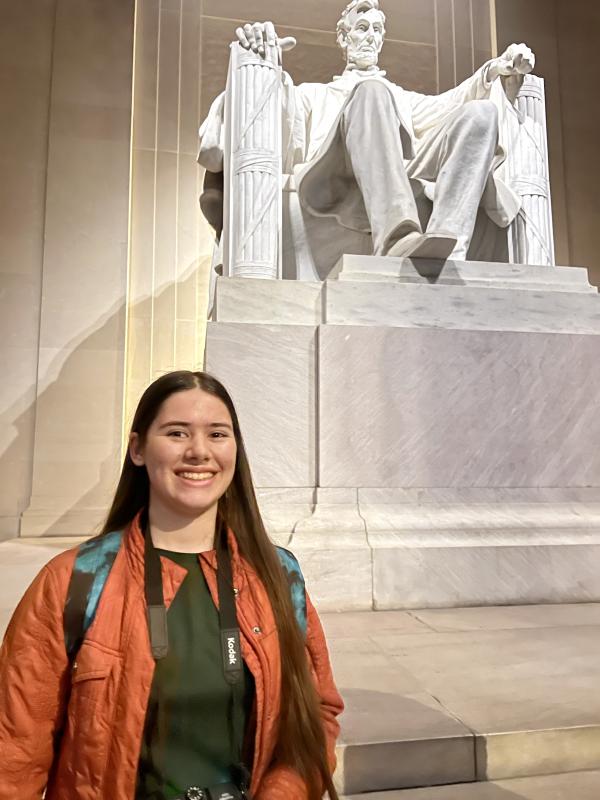 Sabrinnah from Lincoln County visited the Lincoln Memorial while in Washington D.C. for the National 4-H Conference. (Photos courtesy University of Maine Cooperative Extension / Jessy Brainerd)
Sabrinnah from Lincoln County visited the Lincoln Memorial while in Washington D.C. for the National 4-H Conference. (Photos courtesy University of Maine Cooperative Extension / Jessy Brainerd)
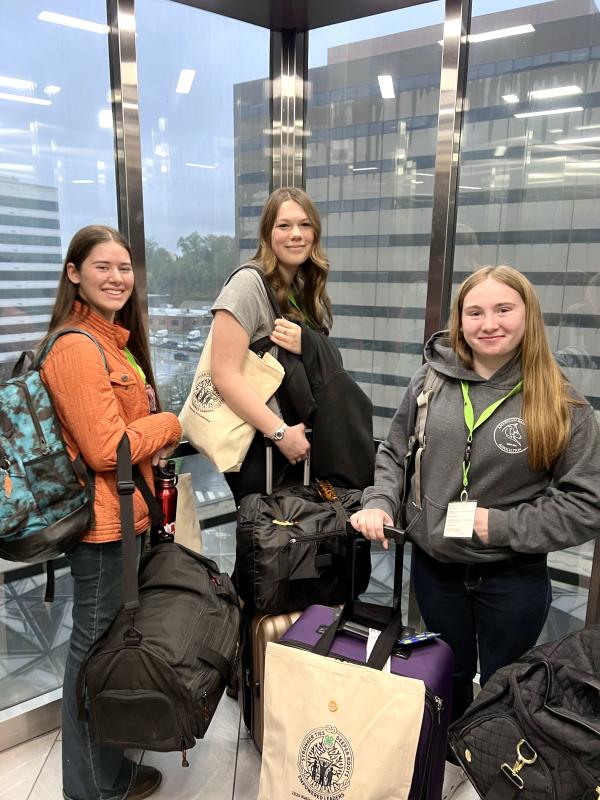 Sabrinnah from Lincoln County, Kai from Washington County, and Kaylee from Penobscot County attended the 4-day National 4-H Conference in Washington D.C. in April. (Photos courtesy University of Maine Cooperative Extension / Jessy Brainerd)
Sabrinnah from Lincoln County, Kai from Washington County, and Kaylee from Penobscot County attended the 4-day National 4-H Conference in Washington D.C. in April. (Photos courtesy University of Maine Cooperative Extension / Jessy Brainerd)
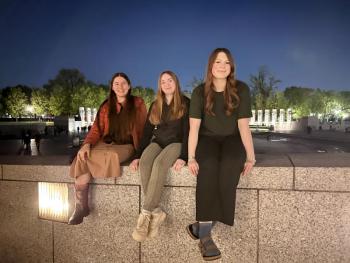 Sabrinnah from Lincoln County, Kaylee from Penobscot County, and Kai from Washington County visited the World War II monument while in Washington D.C. for the National 4-H Conference. (Photos courtesy University of Maine Cooperative Extension / Jessy Brainerd)
Sabrinnah from Lincoln County, Kaylee from Penobscot County, and Kai from Washington County visited the World War II monument while in Washington D.C. for the National 4-H Conference. (Photos courtesy University of Maine Cooperative Extension / Jessy Brainerd)
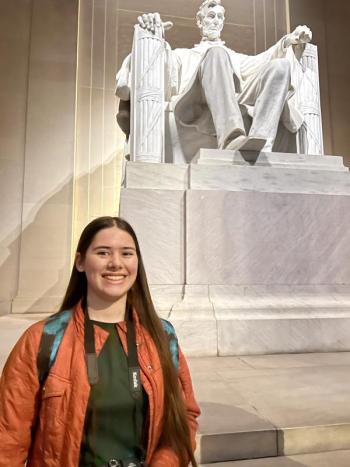 Sabrinnah from Lincoln County visited the Lincoln Memorial while in Washington D.C. for the National 4-H Conference. (Photos courtesy University of Maine Cooperative Extension / Jessy Brainerd)
Sabrinnah from Lincoln County visited the Lincoln Memorial while in Washington D.C. for the National 4-H Conference. (Photos courtesy University of Maine Cooperative Extension / Jessy Brainerd)
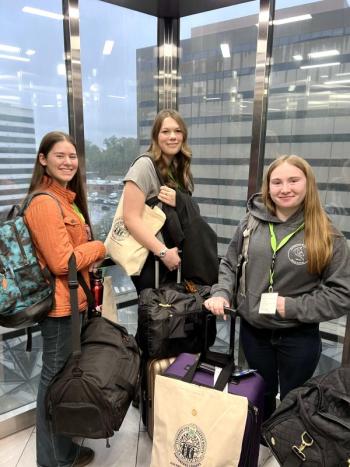 Sabrinnah from Lincoln County, Kai from Washington County, and Kaylee from Penobscot County attended the 4-day National 4-H Conference in Washington D.C. in April. (Photos courtesy University of Maine Cooperative Extension / Jessy Brainerd)
Sabrinnah from Lincoln County, Kai from Washington County, and Kaylee from Penobscot County attended the 4-day National 4-H Conference in Washington D.C. in April. (Photos courtesy University of Maine Cooperative Extension / Jessy Brainerd)
Every spring, hundreds of teenagers descend on the nation’s capital for a multi-day conference where they learn how the US government works and have a chance to share their voices with federal agencies and congressional committees. The National 4-H Conference, held in April, welcomes youth ages 15-19 from across the country and provides an opportunity for participants to tackle some of the most important issues facing policymakers today.
This year, Maine’s three delegates represented a range of backgrounds and interests. Sabrinnah, from Lincoln County, has completed many animal science 4-H projects over the years but notes how the program also sparked a new love of creative pursuits like writing and photography. Kaylee, from Penobscot County, raises goats with her grandparents. One of the youngest breeders in the state, she’s been successful showing her herd at local agricultural fairs and has created a retail business selling goat’s milk soap. Kai, from Washington County, is a long-time 4-H camper where she discovered a passion for fostering a better future for the planet. She’s set her sights on becoming a camp counselor and also works as a rural youth organizer, focusing on several climate change projects in her local community.
“The National 4-H Conference is such a unique experience where youth work together to answer real questions from government agencies currently working to address change on a societal level,” said Hannah Carter, dean of Extension and associate provost of online and continuing education at University of Maine. “Not only do the delegates have an opportunity to share their recommendations with policymakers, they will bring what they learned back to Maine where they can begin to affect change right in their own communities. I had the opportunity to attend the conference when I was a 4-H’er and it was life-changing.”
The conference, hosted by the U.S. Department of Agriculture and National Institute of Food and Agriculture (NIFA), aims to help youth learn to use their voice and recognize that it has value. Interested teens go through a rigorous application process that includes a resume, personal 4-H story and a live interview with a committee of local volunteers and staff. During the process, they identify the topics they are most passionate about, choosing from areas like national service, NASA earth science, language and AI, youth in rural communities, mental health, agricultural workforce, healthy eating, social media and safety, and access to public lands.
“I chose Engaging in NASA Earth Science,” said Sabrinnah. “One of the things that interests me most about this topic is how much NASA does. I want to let people know that NASA does way more than just send people into space.”
Kai shared, “I’m passionate about forestry and the outdoors. I love hiking, camping, backpacking and our national parks. The question my roundtable tackled was ‘How can we empower and encourage youth to visit our public lands?’ We developed solutions related to social media accessibility, scholarship research opportunities, newsletters, photo contests and finding more engaging ways to bring teens into public lands.”
Once at the conference, participants work in roundtable groups where they address a challenge question and develop recommendations for the government agency tasked with handling the issue. The delegates conduct research, hear from guest speakers, visit federal agencies and may even observe debates on the floor of the Senate or House of Representatives. Throughout the process, they have an opportunity to take what they’ve learned at the local 4-H level and apply it to a real-world scenario. They practice leadership, collaboration, critical thinking and research skills while learning more about networking and social and workplace norms.
“The event is a hallmark of the 4-H positive youth development model built around the concept of thriving and preparing youth for college, careers and becoming a productive adult,” said Kristy Ouellette, state program leader in 4-H youth development. “Participants often cite the importance of the relationships cultivated with their peers as well as the adult chaperones who accompany them.”
A defining trait of 4-H on display at the event is its commitment to youth leadership, with adults intentionally stepping into supportive, background roles. Each roundtable is led by a team of collegiate facilitators—24 college students and 4-H alumni—who host and guide the discussions.
“Delegates also come away from the conference with a new understanding of different careers and pathways, making connections that can open doors to internships and jobs,” said Ouellette. “They learn how other teenagers are participating in 4-H in other parts of the country, often coming back energized about a new issue or opportunity.”
As part of the program, participants are expected to share what they learned with their local peers. With a new understanding of the structure and process of policymaking at the national level under their belt, they return home feeling more comfortable making change in their own communities. Many of them report increased civic engagement, greater agency and higher levels of social and cultural competency.
“My roundtable tried to make NASA more kid-friendly because it can be very intimidating," said Sabrinnah. "We recommended developing a new NASA website geared toward kids with games and activities and also establishing internships for high school and college kids all across the country. I’m excited to teach my town and community what I learned while at the conference.”
“I learned more about myself than I did about the government or my roundtable topic,” said Kai. “I learned how outgoing and ambitious I can be under pressure with a goal in mind and I learned that when I am with like-minded people, I feel the most confident. I learned a lot about the U.S. Forest Service and I can share what I learned with my peers. I can also bring back my ambition and my drive to educate others in my community.”
This year’s trip was funded by the Maine 4-H Foundation with additional support through the Tractor Supply Paper Clover campaign. To learn more about 4-H programs in Maine, visit extension.umaine.edu/4h.
About University of Maine Cooperative Extension: As a trusted resource for over 100 years, Extension has supported UMaine's land and sea grant public education role by conducting community-driven, research-based programs in every Maine county. UMaine Extension seeks to build thriving communities and help grow the food-based economy. Extension also leads Maine’s 4-H program, the most successful out-of-school youth educational program in the state. 4-H programs are grounded in the belief that kids learn best by doing and are developed to fit a variety of backgrounds, interests, budgets and schedules. Participants complete hands-on projects in areas like health, science, agriculture and civic engagement in a positive environment where they are encouraged to take on proactive leadership roles.

